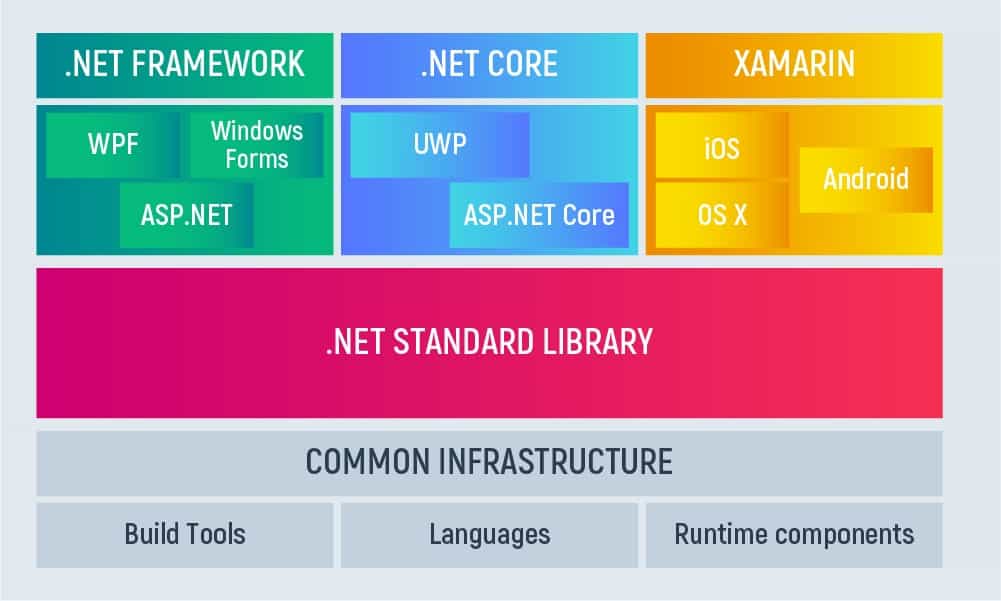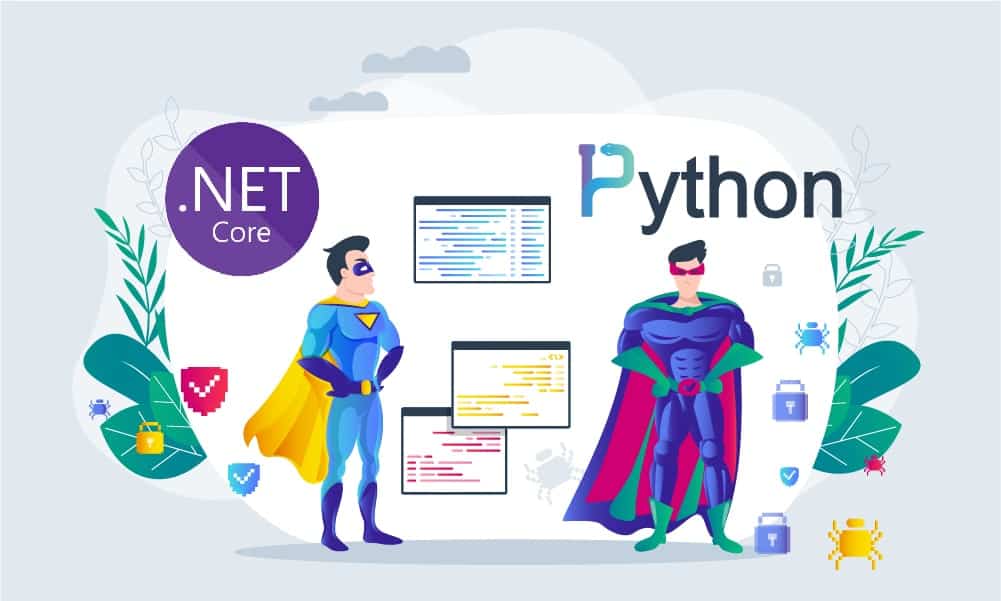Looking for advantages and disadvantages of .Net core vs. python to compare both and decide what’s best for you? In this article, we offer a detailed comparison of .Net vs. Python to help you with evaluation.
- Python
- Key strengths and features of Python
- 1. It’s a dynamically typed language. What does it mean?
- 2. It’s all about asynchronous development
- 3. It stands out with simple syntax
- 4. It provides an extensive list of libraries
- 5. Satisfying performance
- 6. It’s great for Enterprise and Business Application development
- 7. The top language for Artificial Intelligence and Data application development
- Detailed Comparison of .NET and Python
- Python
- C#
- Why .Net Core?
- Features and strengths of .NET Core:
- 1. It’s cross-platform
- 2. Fast compilation and execution time
- 3. Great memory management
- 4. Great for Microservices development
- Consider Inoxoft Your Trusted Partner
- Final Thoughts
Python
What are the key Python features and which projects will Python suit for the best? If to describe Python’s advantages, it would be conciseness, amount of code, and stability. Python back-end technology is the 3rd most loved programming language being a favorite for 49.28% of engineers. When comparing Python and .Net for backend development, Python mostly wins. Python declared itself as an old, stable but explicit, and elegant programming language. Released in 1991, it offered fewer lines of code, readability, and advanced developer productivity.
Over the past two decades, Python’s adoption of large projects has grown a lot. Among companies that use Python: are Google, Mozilla, YouTube, Spotify, Quora, Instagram, Pinterest, and Udemy.
The language gets top awards in a variety of web development aspects and fields. Python is the 1st best language for:
- test automation
- back-end developers to learn
- writing command-line utilities
- writing desktop-Linux applications
Python is the 2nd best language for:
- data science (Julia’s in the first place)
- statical analysis
- analyzing people’s scroll, click, mouse, hover, and other interactions
The whole list of Python awards can be found here.
Key strengths and features of Python
1. It’s a dynamically typed language. What does it mean?
It means faster development and ease of use for Python engineers because in dynamically typed languages the types of variables do not need to be declared. The definition of types happens at runtime. So, in Python not declaring the type of variable won’t cause a problem. Instead in C# or Java programming languages, things won’t go that easy: there is a strict declaration of variables before assigning a value to them.
2. It’s all about asynchronous development
Asynchronous development is parallel programming at which the programming language, Python, in this case, performs multiple things at once. While request 1 is being processed, request 2 is already running. Thus the user receives several responses at a time. That’s why Python can be used for the implementation of CPU-bound tasks that explain its wide usage across multiple fields like data analytics and engineering.
3. It stands out with simple syntax
Python stands out with easier syntax if compared to C#, Java, or other programming languages. Complex code implies more bugs and it’s more difficult to understand for other programmers. The idea behind Python creation was to invent a clear and understandable programming language. Now it makes Python one of the top adored programming languages that solve the problem of scattered and confusing tonnes of code.
4. It provides an extensive list of libraries
Python engineers do not need to invent the wheel themselves. Python ecosystem is well-developed as well as its mature community. In addition to the Python standard library, software engineers can enjoy the whole repository of software (from modules, packages, individual projects to web frameworks) accessible via the Python Package Index. Use NumPy for numerical calculations, Pandas for data analytics, or Pygal for creating vector graphics.
5. Satisfying performance
Python’s performance is optimal, but a bit slower than of C#. However, it’s important to realize that engineers who face critical performance challenges in Python are in the minority. For the majority, Python copes well, even if there is a need to improve performance, the tools to do that are very different. What’s more, CPython, the most widespread reference implementation of Python, is also defined as both compiler and interpreter. Speed can be a problematic point for developers of large projects. Victor Stinner finds performance issues in Python to be investigated more. One of the bottlenecks in Python development is using multiple CPUs at the same time. The best way of analyzing the performance of Python code is profiling for CPU time, but also profiling for memory allocation and I/O.
Technically speaking Python is the oldest programming language and some choices were made 20 years ago for the hardware which is no longer in use.
The first version of Python didn’t support threads, whereas we know that, today, all applications are using threads with 8 to 64 CPUs…Being able to find a trade-off between the stability of the language and the evolution of the implementation is a very difficult task. – resource
6. It’s great for Enterprise and Business Application development
The availability of resources in Python makes it the best choice for enterprise and business development. Python works reliably on Linux, Windows, and OS X which opens many opportunities for business development. Python can be integrated with Java, C, and C++ programming languages, one more plus to consider in case of future integration with enterprise and business systems. Learn more about python’s benefits for business.
7. The top language for Artificial Intelligence and Data application development
Because Python is cross-functional and fast, it’s widely used by mathematicians, data scientists, and engineers. 48% of data scientists indicated Python to be their preferred language over five or more years of experience. It’s known for powerful opportunities in Rapid Application Development, mainly because of dynamic binding and typing.
Python supports object-oriented, structured, and functional programming styles, which makes it possible to adopt Python to different data projects and use cases. Python also provides a vast list of machine-learning libraries. Some examples would be:
- Numpy
- Scipy
- Scikit-learn
- Theano
- TensorFlow
- Keras
- PyTorch
- Pandas
- Matplotlib
Detailed Comparison of .NET and Python
Python is a popular high-level programming language. C#, as Python’s competitor, gave way for .NET, .NET Core, and ASP.NET frameworks. .Net Core is a new implementation of the .NET framework and ASP.NET is designed for web development. Let’s discuss Python vs. .net core performance further<.
C# Python programming languages differ a lot and offer different opportunities in software development.
Python
Comparing .net core vs. python, the latter is explicit and elegant as it is an interpreted, high-level programming language, that is also multi-paradigm and dynamically typed. It can run in any environment. Python has rich libraries. Its speed depends on the interpreter (CPython and PyPy). Even though the speed is rather high, Python can be slower than C#.
At runtime Python figures variables, which means the development using Python is relatively faster. The language has a simpler learning curve. It is great for testing and debugging, AI, ML, Data Science and Analytics, Web Development, DevOps, Enterprise Apps, Game Development, IoT projects, GUI desktop applications.
Python’s most popular high-level web framework with powerful ORM is Django. The best examples of its usage are Instagram, Udemy, and Pinterest. The framework has 53.9K stars on Github, also, there’s a great ecosystem. And there are Python vs. .Net core differences!
C#
It is a high-level, structured, object-oriented, static language, that is also compiled language with a more complicated code. C# runs in IDE. It also has rich libraries. Its compilation is rather easy due to IL (Instruction List). C# performance is high, but all the types of variables must be known and ordered before runtime which means it is slower in development. C# learning curve is steep and it is best suited for building E-commerce web apps, CMS, Email Management Systems, Banking Systems, and Security Management Systems.
Comparing Python vs. asp.net core, the latter is an open-source, general-purpose development platform maintained by Microsoft and the .NET Community. The most popular are Catchpoint Systems, Bluebeam Software, and Kaggle. The platform has 20.2K stars on GitHub. It is cross-platform (supporting Windows, macOS, and Linux and is best suitable for the device, cloud, and IoT applications.
Why .Net Core?
.Net Core is an open-source and general-purpose software framework that allows building applications for Windows, Linux, and Mac operating systems. Powered by Microsoft, .Net core evolved from the .Net framework entering the software development arena with high performance and new opportunities for cross-platform development. .Net Core comes with Visual Studio Code Integrated Development Environment (IDE) which is Microsoft’s most popular code editor.
Features and strengths of .NET Core:
1. It’s cross-platform
The choice of OS is driven by the market demands, end-users and business needs, and the context of an application. If the application infrastructure has to support more resources to be connected to the server, thus more users to involve, you have to think in advance about what tech stack to choose to cover not only Microsoft but Linux or Mac. If you want to develop for these three platforms, .NET Core offers future-in-mind development, an improved version of .NET, that allows flexibility and scalability.
2. Fast compilation and execution time
.Net Core is modular, flexible, and lightweight due to containers allowing to deploy of the application. Thanks to the .NET Standard introduced in 2016, developing applications using the .NET family eliminated the problem of rebuilding the same applications for each separate platform.
Docker is a tool to run, deploy, and build applications easier via containers. It provides a major performance boost and reduces the size of the app. Docker containers are .NET Core virtual machines allowing engineers to deploy applications out of their environment as one whole package. It helps engineers not to worry about customized settings as containers make apps run on any Linux device despite the code differences. With .NET Core, you can buy Linux containers in docker or other places.
3. Great memory management
Python lacks memory management tools and often goes down in the case of heavy memory apps. However, .NET is a fair winner in memory management. .NET is type-safe which means no problems with the object’s memory management. It supports automatic garbage collection and allows cache implementation to be customized, thus .Net engineers can leverage performance. Explore more in Deep Dive into .Net Garbage Collection.
4. Great for Microservices development
Microservices architecture is an approach to building applications consisting of smaller sets of services. Each service runs within its scope of processes and communicates with other services via HTTP/HTTPS protocol. Microservices are beneficial as they allow distributed data storage, unlike monolithic architecture which allows using only one storage for the entire app. Microservices offer flexibility for the team, as each service can be built and deployed independently.
Also, separate hosting of each service can help save costs. ASP.Net core, as the .Net Core web version, is one of the best frameworks recommended for microservices development. ASP.NET Core lets developers deliver cross-platform microservices with .NET on Windows, Linux, or Mac, and also deploy them easily to the cloud.
ASP.Net core takes the next awards in software development:
- The 2nd best microservices framework
- The 3rd place among cross-platform (mobile, web, desktop) that can be used to create commercial applications
- The 6th place in as the best for back-end development
- The 7th as a web framework for creating a web REST API
- The 8th among the best back-end frameworks
- The 11th in the list of the best cross-platform framework
Let’s have a look at the ecosystem of .NET:
Make sure to read our .Net garbage collection!
Consider Inoxoft Your Trusted Partner
Inoxoft is a custom net application development company that also provides Python development services. We approach the process of building in these technologies with:
- Lots of building possibilities
- High scalability of a website
- Boosting app performance
- Cost-efficiency
- Security and anti-threat protection
- Time-effectiveness
- Smart decision-making
- Available dedicated team
Inoxoft can become your reliable partner in achieving your wildest application goals. Trust in our knowledge and experience and obtain the best software on the market with innovative functions!
Discover more: use cases of virtual reality in the medical field
Final Thoughts
What are big data programming languages? Check it out now!
Python and .NET are reliable languages with strong potential in web development. Both technologies provide good performance, an extensive list of libraries, so possibilities to deliver the solution with complex functionality, IoT communication, or AI features. Comparison of .net and python:
- Both Python and .NET offer great integrity and interoperability capabilities
- Both Python and C# offer rich libraries so engineers do not need to invent the wheel themselves
- Application of Python: web development, data science and visualization, AI and ML apps, enterprise and business apps, IoT and game development
- Application of C#: web applications, backend services, Windows services, libraries and components, IoT apps
- C++ and Python are the best programming languages for IoT development
- C++ and Python are the best programming languages for cryptocurrency solutions
If you are interested in developing better web solutions with Python or .Net or need expert consultation on the differences between .net core and python and a detailed comparison of .net and python, feel free to contact us and ask. Get the information you need to start the project with confidence.
Find out what is data lake vs data warehouse!
Frequently Asked Questions
Which is better .NET or Python?
Both .Net and Python are the technologies applied to specific purposes. What one is better for the other might be inappropriate. Everything depends on your business needs and app requirements.
Does .NET core support Python?
IronPython 2 is available for Python2 inside .NET Core.
Should you switch to Python from C#?
If there is a need, you can always switch. It depends on the purpose. Python and .NET are reliable languages with strong potential in web development. Both technologies provide good performance, an extensive list of libraries, possibilities to deliver the solution with complex functionality.










